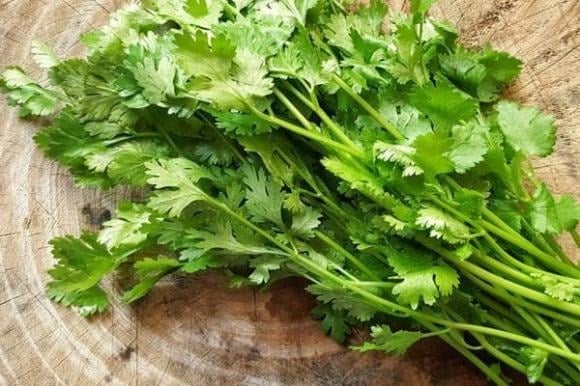Coriander (Cilantro)
Coriander has a spicy, warming flavor and is often used to neutralize the fishy odor of dishes such as fish or mutton. However, when paired with pork, a protein-rich food that tends to be heating, coriander can aggravate digestion and lead to stomach discomfort and bloating. According to traditional medicine, combining two similarly heating ingredients can disrupt the body’s yin and yang balance and, over time, weaken the digestive system.
Additionally, some individuals should limit or avoid consuming pork, especially its organs. This includes people with gout (due to high purine levels), those with dyslipidemia or obesity (due to saturated fat content), and individuals with kidney stones (as it increases oxalate levels).

Starfruit Leaves
Starfruit leaves are believed to aid digestion and detoxification. However, when consumed with pork, especially undercooked pork, the leaves can cause protein precipitation, reducing absorption and digestion. For individuals with stomach ailments, the combination of starfruit leaves and pork may lead to irritation and even poisoning if consumed over an extended period.
Water Buffalo and Beef
In Eastern medicine, pork is considered cooling, while water buffalo and beef are heating. Consuming these meats together creates a clash in their inherent qualities, making it difficult for the body to absorb nutrients and often resulting in a bloated and gassy feeling after the meal.
Furthermore, the protein structures of water buffalo and beef are distinct. When combined with pork in certain ways, they can increase the stomach’s workload. Some medical records also warn that this combination may elevate the risk of parasitic infections, such as tapeworms.

Animal Liver
Liver is a nutrient-dense food, particularly rich in vitamins A, B12, and iron. However, when paired with pork, a fatty meat, it can disrupt nutritional balance and cause a sense of heaviness and indigestion. This effect is more pronounced when using mutton or goat liver, which have a distinctively strong flavor.
Additionally, pork is considered “heating” and can make the digestive environment unstable. This, in turn, affects the liver, which is prone to causing a heavy stomach, resulting in symptoms like bloating, nausea, loss of appetite, or prolonged discomfort after a meal.
Soybeans
Soybeans are an excellent plant-based source of protein, but they also contain phytic acid, which inhibits the absorption of minerals like calcium, iron, and zinc from other foods. When consumed with pork, soybeans not only reduce the nutritional value of both foods but can also lead to digestive issues, especially in individuals with sensitive guts.
If consumed in large quantities in the same meal, the combination of pork and soybeans may cause bloating, indigestion, and a feeling of lethargy and fatigue afterward.
































